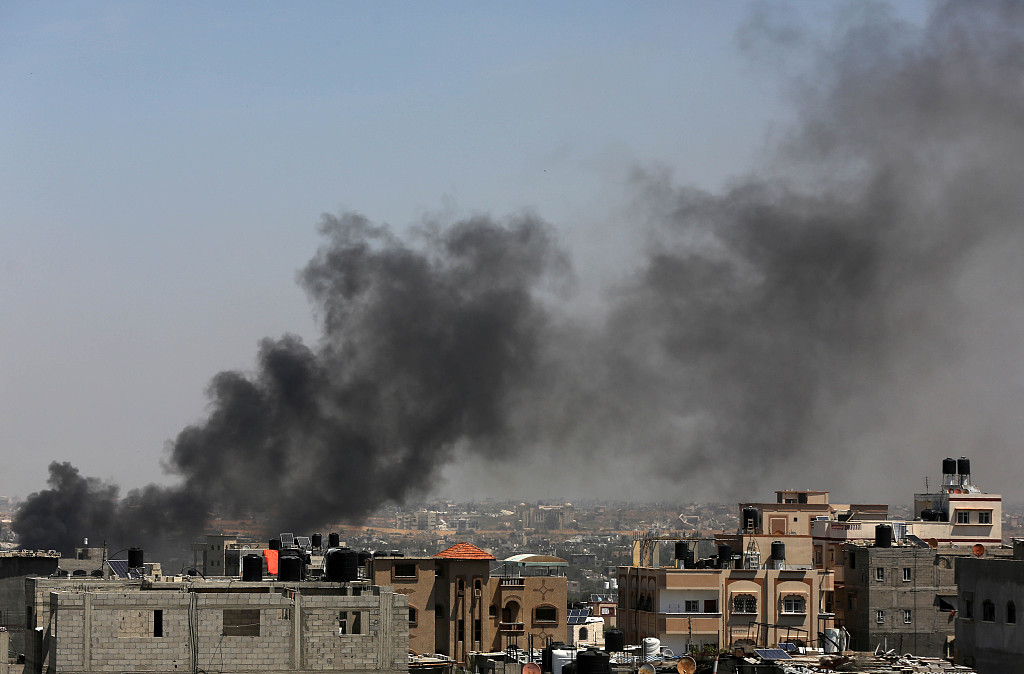
Representatives of the Palestinian Fatah movement and the Islamic Resistance Movement, or Hamas, met in Beijing on Friday to discuss ending the internal divisions in Palestine. This latest development, although not confirmed by Beijing, not only contributes to forging Palestinian unity but also is conducive to defusing the ongoing crisis in the Middle East.
Ahead of the meeting in an interview with the media on Thursday, Khalil Al-Hayya, a leading member of Hamas' political bureau, said the movement was ready to disarm and transition into a political party that is part of a unified Palestinian government on condition that an independent Palestinian state is established along the pre-1967 borders in accordance with the international resolutions.
READ MORE: At least 15 killed in Israeli airstrikes on Rafah
China has taken a low-key approach to the meeting, with the Foreign Ministry simply saying that the country consistently supports internal reconciliation among the different Palestinian factions through dialogue and firmly backs strengthening the internal unity in Palestine.
The meeting is a clear indication that China is making every effort to resolve the crisis in Gaza.
By seeking to facilitate reconciliation between the two Palestinian factions, China hopes the political forces of Palestine can show greater solidarity in promoting a political solution to the conflict that upholds the legitimate rights and political status of Palestine with the support of the international community.
With the Gaza conflict still ongoing, China is maintaining close communication with all relevant parties, actively participating in United Nations Security Council consultations, and pushing for efforts to de-escalate the situation and promote peace talks.
Last month, Chinese diplomat Wang Kejian visited Egypt, Palestine, Israel and Qatar, which also included a meeting with the head of Hamas' political bureau, Ismail Haniyeh, during his visit to Qatar. The latest development in Beijing was only made possible thanks to a series of such diplomatic mediation efforts.
What China has done so far in its efforts to resolve the Israel-Palestine conflict, which includes promoting Palestinian unity, upholding justice at the United Nations Security Council and calling for an immediate cease-fire, stands in stark contrast to those who have constantly fanned the flames of the conflict.
US President Joe Biden on Wednesday signed into law legislation that includes $26 billion in assistance for Israel, the majority of which is earmarked for military spending. Turning a deaf ear to domestic and international calls for it to press Israel to stop the brutal killing of Palestinian civilians, the Biden administration has continued to get blood on its hands by supplying arms to Israel and repeatedly blocking the UNSC's efforts to call for a cease-fire. Earlier this month, it vetoed a UNSC draft resolution to grant full UN membership to the State of Palestine despite its alleged support of the two-state solution.
To date, more than 34,200 Palestinians have been killed in Gaza since Israel launched its military offensive against Hamas. The conflict has not only caused a humanitarian catastrophe but also spilled over to other parts of the region, dragging more parties into the fray.
ALSO READ: Israel is holding more hostages than Hamas
At present, apart from losing the moral high ground because of its callous support of Israel's relentless military offensive in Gaza the US itself is feeling a strong backlash from what it has sowed in the Middle East: Many university campuses in the US are convulsed in chaos as students stage pro-Palestine protests. Hundreds of demonstrators have been arrested amid allegations of police brutality, all triggered by the US' lopsided policy on the ongoing conflict.
The Gaza conflict and its resulting effects show once again that the perpetual denial of the legitimate national rights of the Palestinian people is the root cause of the Palestinian question. It is high time the US stopped being part of the problem with its blind support of Israel and instead became part of the solution by putting its weight behind international peace efforts and joining hands with those countries, such as China, that are actually working to try and secure a meaningful cease-fire in Gaza and a long-term solution to the Israel-Palestine conflict through dialogue and consultations.


